Book Reviews by Genre: Poetry
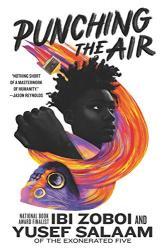
Yusef Salaam is one of the "Central Park Five", young men of color who were incorrectly accused of raping and beating a woman jogging in Central Park in the late 80s. After the five had served their sentences of 5-15 years, they were exonerated when the real culprit came forward. This book is clearly heavily inspired by Yusef's story as it tells the story of Amal, a teen in prison for a similar crime that he did not commit. It starts with the conviction and then moves into Amal's experiences in a juvenile detention center.
Every year, there's a book that I promote really heavily in classrooms. This will definitely be that book. It's so good. So sad. So spare in that way that only books in verse can be. It takes a while to read, because sometimes you just kind of have to sit with it for a while to process it. It does such a great job of illustrating just how deeply flawed and racist our "justice" systems are. I dare you not to empathize with Amal. I can't wait to share this important book with everyone I know! Also, like, that cover y'all. So pretty. And it's relevant to the story! Anyway, consider this required reading, especially for all the folks trying to "read woke". 5 stars.
Thanks to Edelweiss and Balzer + Bray for the eARC which I received in exchange for an unbiased review. Punching the Air is out 01 September - put your copy on hold today!
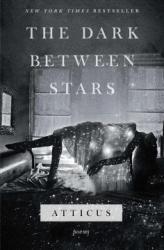
“The Dark Between Stars” is a hearthrobing book of poetry filled with the contrasting stories of the hope and despair that come with the human experience. The author Atticus, transports his readers back to their own memories, feelings, and emotions with his very relatable and beautifully written poetry. On each page I could see a different image or feel a different emotion which I think is the remarkable thing about the book. My favorite poem from the book was “The problem with falling in love is that everything else in life becomes boring by comparison”. I would highly recommend this book to any poetry lover, I have never before been so transported into my own thoughts and feelings while reading before.
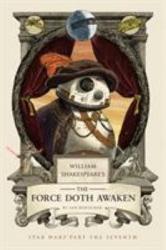
As I’ve been working my way through Ian Doescher’s Shakespearean adaptations of pop culture movies, I think I’ve hit the point where the novelty has worn off. For whatever reason, I didn’t feel like The Force Doth Awaken had the same charm as other entries in this quirky mash-up series. I have a sneaking suspicion that this may be due to one of two factors: 1. The newer movies have more “modern” dialogue that seemed as if it was directly plopped into the Shakespearean format, or 2. The original trilogy had more time to be ingrained in my psyche, and the translation to Shakespearean felt appropriate.
I don’t want to downplay the novelty of this adaptation, though. The voice acting is still superb, and the sound effects add a little something extra that immersed me as I listened to this audiobook. Plus, it’s not like these books are that lengthy anyway. If anything, I’m out a little over an hour of my time to listen to it (since I listen at 2x speed). I did appreciate that Chewie finally received the internal monologue that R2-D2 originally had since these un-translatable individuals still have something to add. I was, however, disappointed that BB-8 didn’t have the same treatment.
One of the other factors with this “translation” that I wasn’t too keen on was the meta aspect that kept winking at the reader and saying, “See? Do you get that reference?” I understand that everything exists in the Star Wars universe, but I think most people who will pick up this book will already know those references anyway and don’t need the coy allusions to other parts of the series. Of course, I’ll still end up listening to the rest of these when I can get them from my library, but The Force Doth Awaken felt like a low point (at least until I get into the prequels).
An almost too modern and meta Shakespearean adaptation, I give The Force Doth Awaken 3.5 stars out of 5.
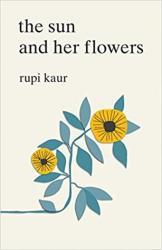
The Sun and Her Flowers is a book filled with relatable poetry. The poems are mainly focused towards a female audience, and bring to light the realities and harshness of life. The book has three parts that are based on the flowers, blooming, withering, and rebirth. The poems follow those specific categories with happy, sad, and hopeful poems centered around it. The poems are also centered around heartbreak and love, some of the poems share lovely scenes of first dates; where others are tragically centered around heartbreak. Poems of heartbreak talk of crushes not sharing love for the other, and relationships that took a turn. The poems are easily relatable to teenagers and the daily struggle of their lives. I gave this book a high rating because it not only made me laugh and smile but it also moved me to tears several times throughout, the poetry is touching on an outstanding level.
Reviewer Grade: 12
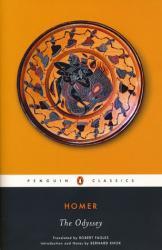
The Odyssey is an epic poem written by Homer, and it is a literary classic about two great quests. Ten years after the fall of Troy, Odysseus still hasn't returned home to Ithaca, and his house is plagued with suitors wanting to marry his wife, Penelope. His son, Telemachus, feels overwhelmed but is sure that Odysseus isn't dead. With the help of the goddess Athena, he sets off to search for his father as the reader learns more about Odysseus's previous journey and resulting enslavement. Telemachus encounters many obstacles which shape him and build his confidence by the end of the story.
Although this book is a classic and was probably very popular in ancient Greece, it is not an enjoyable book to read. There is too much unnecessary dialogue, and the plot is excessively long. Due to the old language and lengthy descriptions, reading The Odyssey is a very strenuous task.
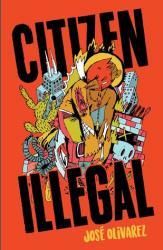
I want to start by saying this book is definitely intended for an older, more mature, audience. This book uses many curse words and makes some drug references. “Citizen Illegal” is a series of poems depicting life as a legal citizen citizen of the United States whose parents are illegal immigrant. I picked up this book primarily because it was on the adult reading list in addition to being interested in a different perspective on illegal immigrants. I have never read a book in verse before so I really enjoyed the way the speaker developed. The book was pretty good and I felt brought me a new perspective on illegal immigrants.
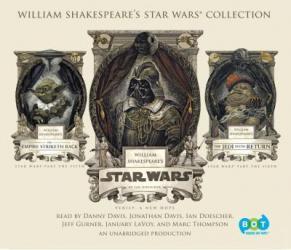
I said it for my review of Shakespeare’s Star Wars , and I’ll say it again: this combination of old verbiage and meter with popular science fiction is a match made in heaven. The follow-up to the first part of the original trilogy, Shakespeare’s The Empire Striketh Back continues to be an amusing exercise that anyone who loves Shakespeare and/or Star Wars will enjoy. Some consider Empire to be the best part of the original trilogy, and its adherence to the plot won’t disappoint. Additionally, the audiobook version continues to use music, sound effects, and voice acting to recreate an experience as close to the source material as possible.
While the audiobook did provide a robust experience of the text (especially the voice actors who recreated Han Solo and C-3PO’s speech patterns), the author’s explanation at the end made me realize there were some aspects that weren’t quite as clear as they would have been if I had just read the book normally. For instance, Yoda’s typically backward speech wasn’t as backward as I would have thought—mostly because the Shakespearean cadence sounds a little backward. Instead, Yoda spoke in haiku, which I’m sure would have been more evident if I was reading the words on the page.
As I mentioned above, Empire is the favorite of many Star Wars fans. However, I’m one of the rare few (like the author) who find Return of the Jedi to be their favorite of these first three films. Consequently, since this book held close to the original plot, it seemed to sag a little between the opening act on Hoth and the third act in Cloud City. At least the added soliloquies from ancillary characters like the AT-AT walkers, random Stormtroopers, and the dangerous creatures of the universe added in some humorous elements to the narrative that weren’t strictly canon.
A fantastic audiobook that still might require a read-through, I give Shakespeare’s The Empire Striketh Back 4.5 stars out of 5.
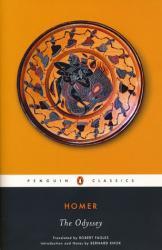
This epic poem is one of the most fascinating pieces of literature I have ever read. Following the story of Odysseus, it is an epic journey where gods and mythical monsters try and impede his journey home. There is mythology intertwined with adventurous storytelling, and the style of writing, while obviously more difficult than modern writing, is not too challenging that it makes the poem hard to read. I would recommend reading it for both its historical significance and because of how interesting the story itself is. While it will take some time to get through, the story, I believe, is worth the time. The monsters that Odysseus encounters barter with him and tell him stories that deepen the plot; his interactions and relationships reveal mysteries and provide new motivations or points of interest.
Everything is complexly interconnected and it does take a bit of historical context or background knowledge to understand all parts of the story, so it is an undertaking. However, the fantastic and timeless story is entirely unique. I would give it five out of five stars.
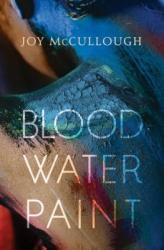
"Let me show you
what a woman can do."
Artemisia Gentileschi is a painter. But because she's a painter in Rome in the early 1600s, she cannot take credit for her work. All of the credit goes to her father, who is a painter himself, though not a good one. When her father solicits the help of fellow painter Agostino Tassi to develop Artemisia's perspective, she thinks that finally her work might get taken seriously. But after Tassi brutally rapes her, Artemisia must decide whether she wants her life to continue as close to "normal" as possible, or if she wants to speak her truth and risk her painting career or worse: death.
Unbeknownst to me until about halfway through the book, this story is actually based on a true one, which makes what is already a beautifully written gut-wrenching book all the more poignant. Artemisia is a woman unhappy with her unfair lot in life, and she uses her art to express that by depicting Biblical women (primarily Susana and Judith) realistically instead of through the male gaze. Judith and Susana's stories as told to Artemisia by her late mother are sprinkled throughout the book, and are the only parts not written in verse.
Blood Water Paint is so timely. It's primarily about a woman's ability to speak her truth, and as we live in the time of the #MeToo movement it all feels so horribly relevant. As terrible things are happening in the book, you can see them mirrored in today's society. But ultimately, even as it's depressing (and it is brutal), the book is empowering and inspirational, and Artemisia is the quintessential example of a strong female character - her strength in the face of insane adversity is even more affecting given that it's based on a real woman.
I can think of no better book to read for National Women's History Month (or really, at any time). I'd strongly recommend this to both teens and adults, and I won't be surprised should it garner several nominations and/or wins when book award season rolls back around. This is one that is not to be missed. 5 stars.
Thanks to Netgalley and Dutton Books for Young Readers for the eARC, which I received for review consideration. Blood Water Paint is available now!
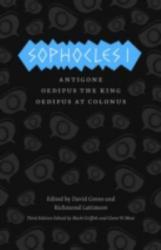
The hero isn’t always epic and won’t always have a happy ending, sometimes he may face a tragic event and meet his downfall. Sophocles Athenian tragedy Oedipus Rex, or Oedipus the King, is a phenomenal play written and first performed around 430 B.C. The play follows the story of Oedipus, a man who became the King of the city Thebes by solving a riddle and defeating a sphinx that was threatening the city and then marrying the queen of Thebes, Jocasta. One day, when Thebes is suffering from a catastrophic plague, Oedipus sends his brother-in-law Creon to an oracle to find out how to stop the plague. Creon returns telling Oedipus that the plague will cease if the killer of the previous king, Laius, is found and exiled. Little does Oedipus know, he is Laius’s killer. Before Oedipus was born, a prophecy was told to Jocasta that her son would kill his father and marry his mother, and so she sent her son out to be killed in the mountains. That boy was Oedipus, and as the prophecy stated, he has returned to Thebes unknowingly to fulfill that prophecy. I love this Greek play by Sophocles because it is one of the first pieces of literature that tells the story of the “tragic hero” and his downfall. I recommend this play to all, but more advanced readers as the translation is also a bit complex.
Reviewer Grade: 11
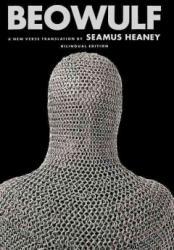
The mighty hero triumphs over evil and saves the people from utter destruction. Sound familiar? Of course it does, it’s the basic plot line of the cliche hero’s tale that everybody knows. However, all of these tales most likely spawned from Beowulf, the oldest surviving English poem written in Anglo - Saxon around the 11th Century A.D. Beowulf is an epic poem that begins with Hrothgar, King of the Danes. Hrothgar’s people live in peace when they are attacked and threatened by a monster named Grendel, who kills off the Danes everynight in their mead-hall, Heorot. So in comes Beowulf son of Ecgtheow, a mighty warrior from Geatland who promises to defeat Grendel and bring prosperity back to the Danes. Beowulf is an amazing poem as it not only tells the classic tale of the epic hero and his journey, but contains hidden meanings aside from literal. Beowulf has no known author, but contains elements of factual history, which tells us this may be a tale describing actual events. This piece of literature is a traditional master piece and should be preserved as an example of how words and tales can evolve over decades. Reviewer Grade 12.
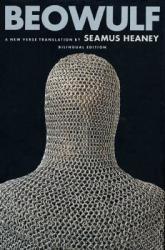
Beowulf is a classic heroic epic written one thousand years ago; I read the version that Seamus Heaney translated into modern English. This translation was excellent, managing to balance the original style and rhythm with a clear and understandable tone. Beowulf is a traditional hero. As a result, some of the plot points are fairly predictable. Nevertheless, I would recommend this epic poem to anyone who enjoys Tolkien or other fantasy series. Reading Beowulf, it is easy to see where more contemporary authors got their inspiration.
Reader Grade: 9